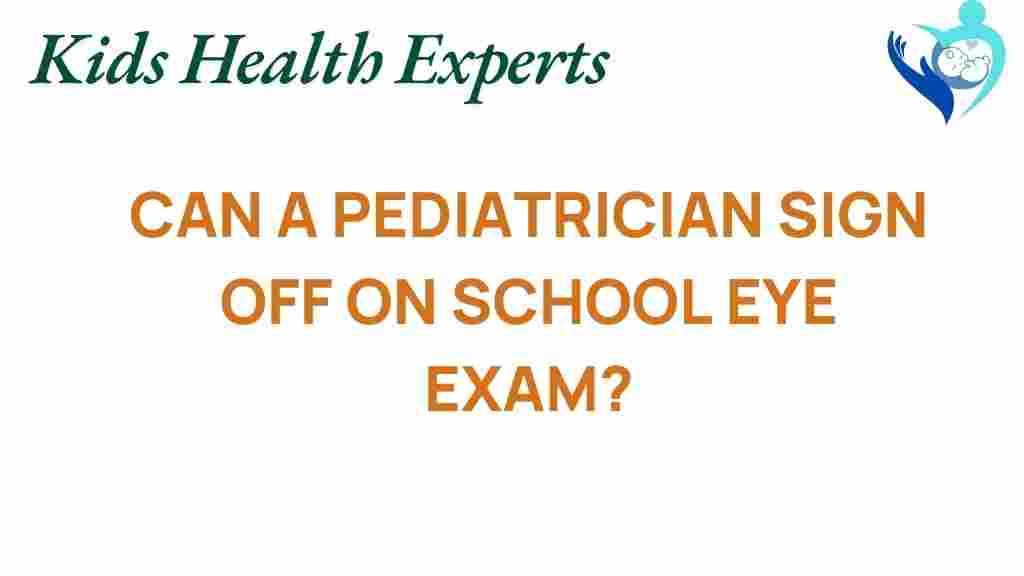Can a Pediatrician Approve Your Child’s School Eye Exam?
When it comes to your child’s health, vision is often an overlooked aspect. School eye exams play a crucial role in ensuring that children can see clearly and perform well academically. However, many parents wonder if a pediatrician can approve a school eye exam. This article will explore the relationship between pediatricians, school eye exams, and the overall vision health of children. We’ll also provide guidance on how to navigate the process effectively.
Understanding the Role of a Pediatrician in Eye Care
Pediatricians are medical doctors who specialize in the health and development of children. They play a vital role in monitoring various aspects of children’s health, including vision health. While pediatricians are not eye care specialists, they can identify potential vision problems during regular check-ups and make referrals to optometrists or ophthalmologists for more thorough evaluations.
- Early Detection: Pediatricians can help identify issues such as strabismus (crossed eyes) or amblyopia (lazy eye).
- Referral: If a pediatrician suspects a vision issue, they will refer your child to an optometrist for a comprehensive eye exam.
The Importance of School Eye Exams
School eye exams are essential for children as they often serve as the first line of defense in detecting vision problems. Many schools have programs in place to conduct routine eye tests, ensuring that all children receive the necessary evaluations. Here’s why these exams are so important:
- They help identify vision problems early, which can affect learning and development.
- Regular eye tests can catch changes in vision that may not be noticeable at home.
- They provide a baseline for future eye health assessments.
Steps for Getting Your Child’s School Eye Exam Approved
Getting a school eye exam approved through your pediatrician involves a few straightforward steps:
1. Schedule a Pediatrician Appointment
Start by making an appointment with your child’s pediatrician. During this visit, you can discuss any concerns you have regarding your child’s vision health.
2. Discuss Vision Health Concerns
Be open about any symptoms or concerns you have noticed, such as:
- Squinting or tilting the head to see better
- Frequent complaints of headaches
- Difficulty focusing on the board at school
3. Obtain a Referral
If the pediatrician finds that a school eye exam is necessary, they will provide a referral to an optometrist. This referral is important for ensuring that your child receives a comprehensive evaluation.
4. Schedule the Eye Exam
After receiving the referral, schedule an appointment with an optometrist. Make sure to inform them about the referral and any specific concerns discussed with the pediatrician.
What to Expect During the Eye Exam
During your child’s eye exam with the optometrist, several tests will be conducted to assess their vision. Here’s a typical process:
- Visual Acuity Test: Measures how well your child can see at various distances.
- Eye Alignment Test: Checks for issues such as strabismus.
- Refraction Test: Determines the correct prescription for glasses, if needed.
- Eye Health Assessment: Examines the overall health of the eyes.
Parental Guidance for Eye Care
As a parent, you play a critical role in your child’s eye care. Here are some tips for maintaining your child’s vision health:
- Regular Check-Ups: Schedule regular visits with both the pediatrician and optometrist.
- Monitor Screen Time: Limit screen time and encourage breaks to reduce eye strain.
- Healthy Diet: Provide nutritious foods that support eye health, such as carrots, leafy greens, and fish.
Troubleshooting Common Issues
If your child is experiencing vision problems or if the school eye exam reveals issues, here are some troubleshooting tips:
- Follow Up: Make sure to follow up with the optometrist for any prescribed treatments, such as glasses or eye exercises.
- Stay Informed: Educate yourself about your child’s specific vision condition and how to manage it.
- Communicate with Teachers: Inform your child’s teachers about any vision issues so they can provide necessary accommodations.
Educational Requirements for Vision Health
School districts often have specific educational requirements regarding vision health. It’s essential to be aware of these to ensure your child meets all the necessary criteria:
- State Regulations: Many states require a vision screening before entering kindergarten.
- Annual Exams: Some schools recommend annual eye exams, especially for children with existing vision problems.
Conclusion
In conclusion, a pediatrician can play a crucial role in your child’s vision health, including the approval of school eye exams. By working together with your pediatrician and an optometrist, you can ensure that your child receives the necessary eye care to support their learning and overall health. Regular eye tests are essential for early detection of potential vision problems, so don’t hesitate to advocate for your child’s needs.
For more information on children’s health and vision care, you can visit this resource for additional guidance. Remember, your proactive approach to eye care can make a significant difference in your child’s educational experience and overall well-being.
This article is in the category Care and created by KidsHealthExperts Team
